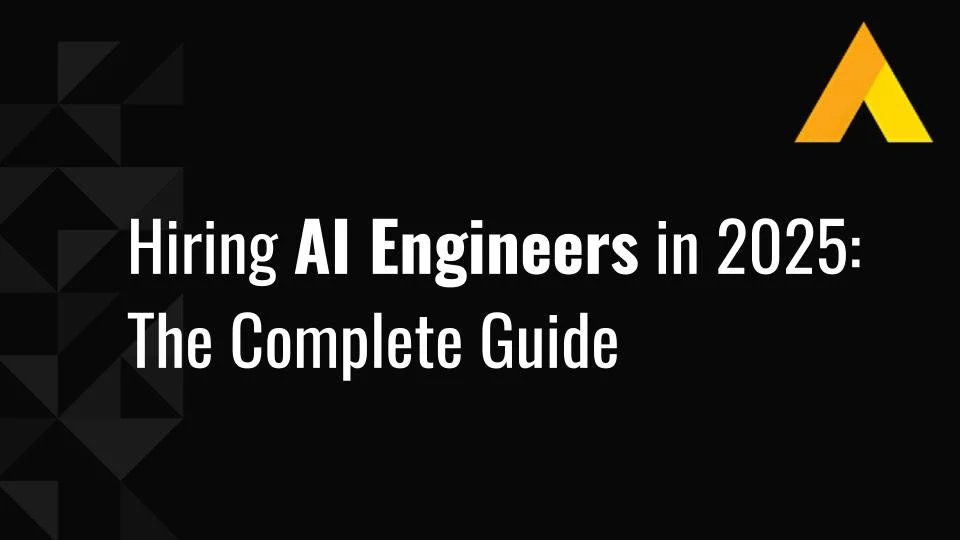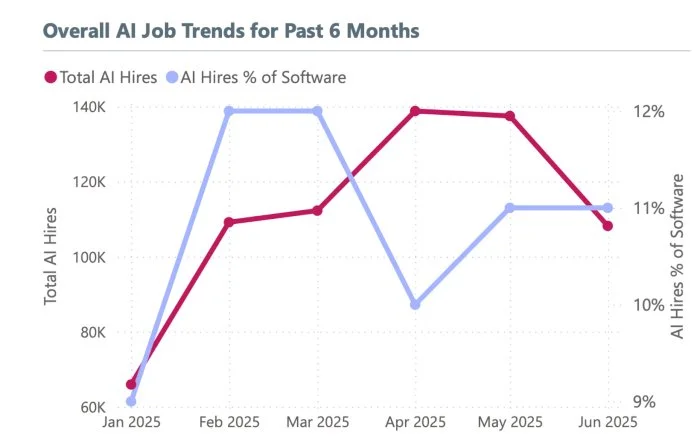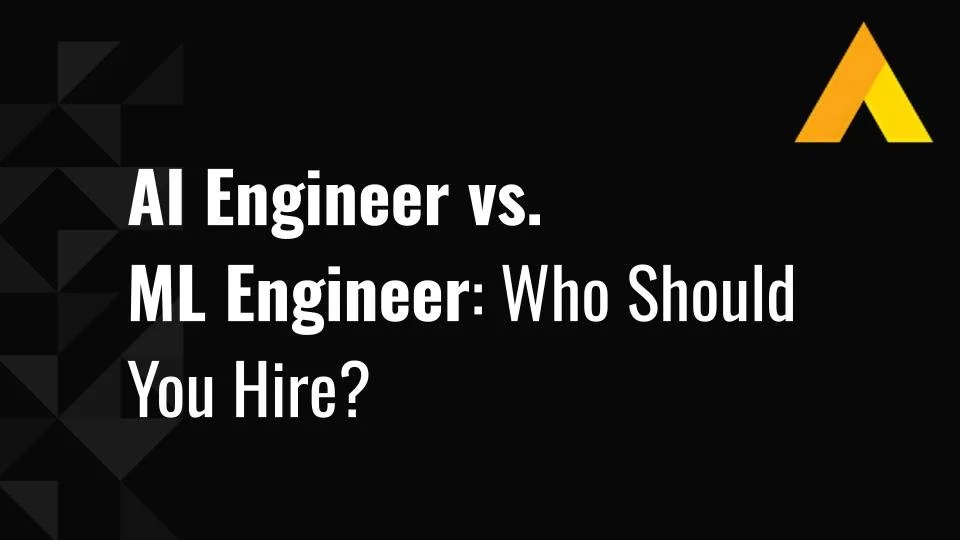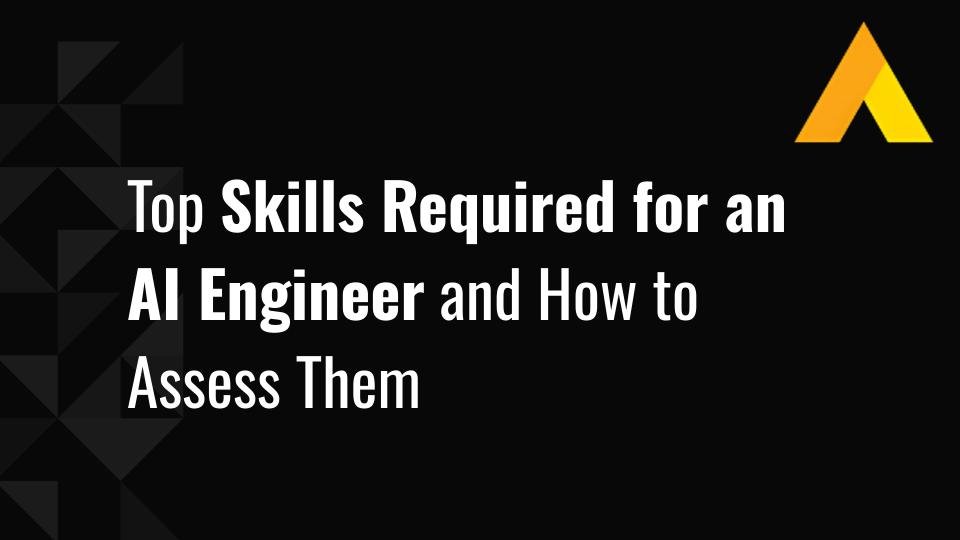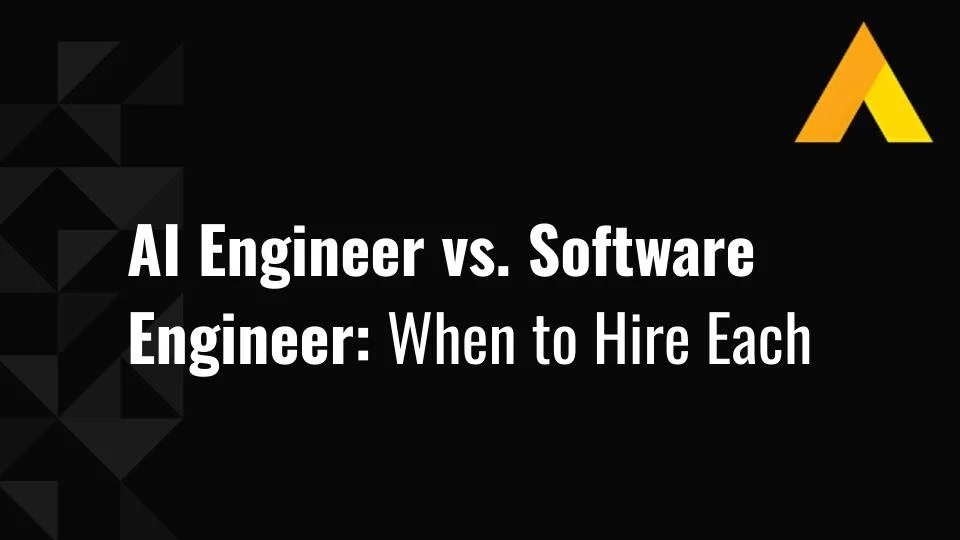Hiring AI Engineers in 2025: The Complete Guide
As we move through 2025 and into 2026, the role of the AI Engineer in your company has moved from a bonus skillset to a business necessity. The days of running a few isolated machine learning models are fading. Now, businesses are embedding artificial intelligence across everything, from product innovation to operations and real-time decision-making.
And the shift is showing up in the data.
The PwC 2025 Global AI Jobs Barometer found that nearly every industry is increasing its use of AI-exposed roles. It found that 66% of jobs most impacted by AI are experiencing faster skill evolution than those that aren’t.
At the same time, job postings for AI roles nearly doubled, jumping from around 66,000 to almost 139,000 between January and April 2025.
If you want to stay ahead of the curve, the right AI talent is non-negotiable. Machine Learning Engineers, AI Developers, and data scientists are roles that have become the backbone of real progress.
That’s why, at Alpha Apex Group, we help organizations go from testing the waters to fully integrating AI into how they work, hiring AI and ML engineers that actually move the needle.
In this guide, we’ll walk through how to:
Find and attract top-tier AI engineers
Evaluate domain expertise in areas like Deep Learning, Neural Networks, Large Language Models, and data-driven systems
Retain top AI talent in an industry that’s changing fast
We’ll also connect the dots between AI hiring and your broader tech stack, including Data Science, Data Engineering, cloud computing, and infrastructure, so your AI strategy isn’t just smart but scalable too.
Keep reading below.
Why AI Engineers Are Crucial for Modern Businesses
These days, companies aren’t debating if they should bring artificial intelligence into the mix. They’re asking how fast they can make it happen. And driving that shift are AI engineers.
AI Engineers’ Strategic Impact: Automating, Improving & Building
AI engineers play a hands-on role in reshaping how businesses operate, and they tend to do it in three key ways:
AI Engineers Automate Processes
AI engineers design clean data pipelines, deploy trained models, and connect them to core systems. That’s how they eliminate the friction of manual workflows. The result is saving more time and achieving scalable efficiency.
In fact, research shows AI can drastically boost productivity by taking on complex tasks that once demanded hours of human effort.
AI Engineers Improve Decision-Making
AI engineers are the people behind the machine learning algorithms and neural networks that go far beyond standard analytics. Think real-time decision support, scenario modeling, and adaptive systems that continuously learn and evolve.
Besides, one study found that companies using predictive analytics are twice as likely to exceed their revenue goals. Well, AI engineers can power that, too.
AI Engineers Create New Digital Products
AI engineers fine-tune existing systems, yes. More importantly, they build what’s next. From generative AI tools and recommendation engines to autonomous systems and intelligent customer platforms, they’re shaping some of today’s most innovative digital experiences.
And if you’re hiring good AI engineers, your investment will pay off. In fact, one report estimates that applying generative AI to real-world use cases could generate between $2.6 to $4.4 trillion annually across 63 use cases.
At AAG, we take a practical approach to scaling AI capabilities. Through our holistic “People, Process, and Profit” framework, we help organizations embed AI in a way that streamlines operations and amplifies innovation. After all, we want your automation initiatives to be sustainable and aligned with your business goals.
Real‑World Transformations Powered by AI Engineers
To see the real value of AI engineers, just look at how they’re driving change in key industries:
In finance: Firms are using AI-powered predictive analytics for fraud detection and risk modeling, with real success in reducing false positives and financial losses.
In manufacturing & engineering: Predictive maintenance tools, designed by AI engineers, are helping companies spot equipment issues before they cause downtime. In some cases, they’re also enabling autonomous systems that improve efficiency and safety on the factory floor.
In product-focused companies: Teams are moving from traditional dev stacks to systems built with deep learning, LLMs, and advanced data pipelines, giving them real advantages over competitors still using legacy tech.
AI‑Driven Operations: The Core of Digital Transformation
Looking ahead to 2026, one thing is clear: AI isn’t just part of digital transformation. It is the transformation.
In a recent survey, 49% of tech leaders said AI is already integrated into their core business strategies. And they’re seeing big returns, with 20–30% improvements in things like productivity, speed to market, and revenue.
That puts AI engineers right at the center of it all. They’re not just writing code. They’re helping shape how your business learns, scales, and adapts.
Pro tip: If you want to use digital tech to drive growth, our Culture Performance Intelligence™ system will help you achieve 3.8x faster transformation and 87% improvement in leadership alignment. See our digital transformation services today.
Transitioning to the Next Step: What Makes AI Engineers Different
The key takeaway for all of this? AI engineers are not traditional software developers. They work in different tech stacks and think in terms of models and systems. They require infrastructure and support that aligns with fields like machine learning, generative AI, data science, and data engineering.
AI Engineer vs Software Developer: Key Differences Explained
It’s easy to group AI engineers and software developers together. After all, they both write code and build systems. But what they build for is very different.
AI engineers focus on creating intelligent systems powered by machine learning, deep learning, neural networks, and data pipelines. Software developers, on the other hand, design and maintain the architecture, APIs, and interfaces that keep products running smoothly.
At AAG, we often work with clients to clarify where these roles overlap and where they diverge. That’s why our advisors help organizations hire based on AI maturity and strategic need. For that, we use highly targeted capability assessments and workforce diagnostics.
In fact, the Culture Performance Intelligence™ system we told you about before has 99.7% reliability and 92% bias elimination.
What AI Engineers and Software Developers Actually Do
Both roles share a foundation in programming (Python, Java, C++), logic, and system design, but they apply those skills differently. AI engineers work with data, algorithms, and models. Software developers focus on structure, functionality, and user experience. Together, they bring intelligence and usability to every digital product.
| Aspect | AI Engineer | Software Developer |
|---|---|---|
| Focus | Thinks in terms of algorithms and statistics. E.g., selecting the right machine learning model, designing network architectures, and managing model drift. | Focuses on modular logic, system architecture, and user experience. |
| Data Work | Handles large datasets like labeling, preprocessing, building data pipelines, tuning hyperparameters, and monitoring model performance. | Typically consumes these tools via APIs, rather than building them from scratch. |
| Lifecycle | Data collection → model training → validation → deployment → monitoring → retraining | Requirements → design → implementation → testing → deployment → maintenance |
| Business Impact | Drives outcomes through automation, prediction, and intelligent behavior, e.g., recommendation engines, predictive analytics. | Delivers value through scalable platforms, functional UIs, and robust backend systems. |
Why Getting the Roles Right Matters
When the distinction between AI engineers and software developers gets blurred, projects slow down. You might have brilliant AI models that never make it into production, or developers who can’t scale or maintain ML systems. Misaligned expectations, stretched budgets, and stalled innovation are common side effects.
Understanding these differences and hiring with AI maturity in mind ensures every role contributes real value to your business outcomes.
Pro tip: Looking to hire a developer, not an AI engineer? This guide shows you how to hire a full-stack developer who fits your company like a glove.
Hiring Tip: Aligning AI Hiring with Business Maturity
Before you post a job or schedule interviews, ask: Where are we on our AI journey?
If you’re experimenting with generative AI or proof-of-concept models, you’ll need AI engineers who can prototype quickly and refine fast. But if you’re scaling across the enterprise, look for engineers who understand deployment, reliability, and how to work seamlessly with software developers.
Remember: When your hiring strategy matches your AI maturity level, you’re building capability that grows with your business.
Industries Driving Demand for AI Talent
As more organizations integrate intelligent systems into their operations, the demand for skilled AI engineers continues to grow. Across industries, companies are rethinking how they hire, build, and scale AI expertise. From established sectors like healthcare, finance, and automotive, to fast-emerging areas expected to lead by 2026, AI is becoming central to how businesses innovate and stay competitive.
AI Engineers in Healthcare
In healthcare, AI engineers are driving breakthroughs in diagnostics, medical imaging, predictive care, and advanced patient-data analysis. Their work connects machine learning, neural networks, and data pipelines to massive, highly sensitive datasets that require precision and responsibility.
Success in this space isn’t just about technical expertise. Healthcare-focused AI talent must also understand the complex regulatory and ethical environment they’re operating in. The numbers make it clear how fast this field is evolving:
66% of physicians reported using AI tools in 2024, up from 38% in 2023.
The AI in healthcare market is projected to grow from $36.96 billion in 2025 to over $613 billion by 2034.
AI diagnostic systems are reaching up to 98% accuracy in some image-analysis scenarios.
Because health data is so tightly regulated, demand is rising for AI engineers who can balance innovation with responsibility. These are professionals who understand data privacy, bias, transparency, and compliance frameworks.
Why it matters for hiring: Building AI systems for healthcare requires a different kind of engineer. You need professionals who can develop complete machine learning systems, from data engineering and model training to deployment. All this while navigating strict domain requirements like patient safety, IRB standards, and clinical validation. It’s a very different skill set from someone who builds apps or front-end tools.
AI Engineers in Finance
The financial industry is embracing artificial intelligence to manage risk, prevent fraud, personalize customer experiences, and improve efficiency across every function. To bring these capabilities to life at scale, organizations need skilled AI engineers who understand machine learning algorithms, predictive analytics, real-time systems, and data engineering.
The AI in fraud management market reached $13.05 billion in 2024 and is projected to climb to $31.25 billion by 2029. That means AI engineers are doing their job correctly.
Key trends include anomaly detection, automated transaction monitoring, risk modeling, and generative AI for smarter ppersonalization
By 2026, banks and fintechs are expected to formalize AI governance, model-risk oversight, and compliance roles to keep innovation accountable.
Why it matters for hiring: The best AI engineers in finance know that success is about creating auditable, explainable, and compliant AI systems that integrate seamlessly with cloud platforms and meet frameworks like Basel and GDPR. In finance, the real innovation happens when intelligence meets trust.
AI Engineers in Automotive
The automotive industry is shifting toward smart, connected, and autonomous vehicles, creating a growing demand for skilled AI engineers. From design and manufacturing to fleet management and mobility services, artificial intelligence is becoming the engine of innovation.
AI is now embedded in everything from vehicle design and predictive maintenance to autonomous driving systems.
AI-powered predictive maintenance can reduce downtime and cut costs by flagging issues in real time.
Integration of real-time AI, IoT, sensor fusion, and cloud services is now the industry norm.
What it means for hiring: The next generation of AI engineers in automotive will need to work across both hardware and software, including sensors, telematics, embedded systems, cloud platforms, and ML Ops. General software experience will not be enough. Employers need specialists with deep AI expertise who can design, build, and scale intelligent systems that perform reliably in complex, real-time environments.
Emerging AI Engineering Sectors by 2026
Beyond the big three, several fast-growing industries are quickly becoming AI hiring hotspots.
AI Engineering in Cybersecurity
Artificial intelligence is now central to modern security strategies, powering threat detection, automated response, and anomaly tracking. Some projections suggest AI could automate up to 45% of cybersecurity tasks, reshaping how security teams operate and scale.
AI Engineering in Sustainability & Energy Tech
Organizations are increasingly applying AI to track emissions, forecast demand, and optimize resources. As the push toward net zero intensifies, AI engineers with energy-sector experience are becoming some of the most sought-after hires.
AI Engineering in Retail & E-commerce
From hyper-personalization and AI-generated content to chatbots and intelligent logistics, retailers are using AI to enhance both operations and customer experience. Engineers with strong skills in machine learning, natural language processing, data science, and user experience will be in high demand.
Top Tip: AI hiring is no longer limited to tech giants. Whether you’re in healthcare, finance, automotive, cybersecurity, or retail, the need for skilled AI engineers continues to expand. Aligning your hiring strategy to those needs ensures you’re not just filling roles but building the foundation for long-term, sustainable AI success.
How to Hire AI Engineers: The Complete Plan
As you scale your AI capabilities, hiring the right AI engineers has become a defining factor in how quickly your teams can innovate and deliver value.
The plan below gives you a structured roadmap that covers every stage of the hiring process, from strategy and role definition to sourcing, assessment, and retention.
1. Before Hiring: Build a Strategic Foundation
Hiring an AI engineer should always be connected to your long-term business goals. Successful teams begin by understanding their AI maturity level and defining a talent strategy that fits their operational objectives, whether they are prototyping early ideas or scaling enterprise-wide adoption.
The most effective organizations we’ve seen start with a clear alignment between people, technology, and outcomes. This approach ensures that AI hiring supports measurable business value rather than isolated innovation. Many leaders also find that a mix of in-house and remote talent creates the best balance between agility, intellectual property protection, and scalability.
Pro tip: Interested in scaling fast with remote talent? We’ve reviewed the 10 best remote IT & tech recruitment agencies so you can find the right partner today.
2. Define Project Scope and Role Clarity
Clarity is essential before recruiting any AI professional. Define project goals, outcomes, and how each new role fits into existing structures. That means identifying whether you need a machine learning engineer, an MLOps specialist, a data engineer, or another key function.
A lot of businesses we see hire for technical capability without ensuring structural alignment. We always advise our clients to map where new roles fit. This is the only way to prevent duplication, streamline collaboration, and ensure every hire contributes directly to performance and results.
3. Focus on the Core Skills of an AI Engineer
AI engineers need a combination of technical depth, practical experience, and business understanding. The best candidates demonstrate strength across three core areas.
| Skill Area | What to Look For |
|---|---|
| Machine learning fundamentals | Experience with deep learning, neural networks, and frameworks such as TensorFlow and PyTorch. Familiarity with generative AI, large language models, and multimodal systems will become standard. Strong ability to optimize, test, deploy, and monitor models in production environments. |
| Data engineering expertise | Proven understanding of data pipelines, ETL processes, cloud platforms like AWS, Azure, or GCP, and scalable storage systems. Effective AI engineers prioritize data ingestion, cleaning, and transformation as core elements of success. |
| Soft skills and business understanding | The best AI engineers communicate clearly with non-technical teams, understand business strategy, and address ethical issues such as privacy and bias. Collaboration, communication, and accountability drive high-performing AI teams. |
4. Write a Job Description That Attracts the Right Talent
A clear and specific job description sets the tone for successful hiring. It should link technical expectations to business outcomes and avoid unnecessary jargon.
The goal should be to communicate clarity and purpose. This helps candidates understand how their work connects to measurable results.
When writing your AI engineer job description, make sure to cover these essentials:
| Category | What to Include |
|---|---|
| Core responsibilities | Building, deploying, and maintaining production machine learning models. Partnering in data pipeline design and integrating AI into existing products or systems. |
| Technical stack and domain expertise | Deep learning, NLP, LLMs, cloud platforms (AWS, Azure, GCP), and MLOps tools. Specify frameworks or technologies relevant to your use case. |
| Soft skills and collaboration expectations | Communication, teamwork, and business understanding that align with your company culture and strategic goals. |
Final checklist:
5. Where to Find AI Engineering Talent
Finding top AI talent requires a mix of digital platforms, AI communities, and referral networks.
The best hiring outcomes come from building active networks rather than relying on job boards alone. Use platforms such as LinkedIn, AngelList, Stack Overflow, AI-jobs.net, and GitHub communities, and explore AI Discord groups where engineers discuss real-world projects. Use precise keywords such as machine learning engineer, data pipelines, and generative AI.
Networking events, hackathons, and academic partnerships also help build early access to talent. Hosting small data or model challenges is another way to attract candidates and demonstrate your organization’s AI maturity.
6. Conduct Meaningful Interviews
Move beyond theory and test real capability. Strong interview processes combine technical assessments with problem-solving evaluations.
Use practical tasks such as:
Improving datasets
Building simple models
Optimising architectures
Or deploying to the cloud
Emerging AI interview platforms that simulate machine learning challenges can also give you realistic insights into candidate performance.
Ask engineers to explain how they selected algorithms, managed imbalanced data, balanced accuracy with latency and cost, or monitored model drift and bias. Their ability to reason clearly and adapt their approach will reveal their true level of expertise.
Pro tip: AAG’s assessment methodologies benchmark candidates for technical skill, as well as for strategic value creation and long-term fit.
7. Evaluate Cultural Fit
Company culture matters as much as technical skill. AI engineers should reflect your company’s mission, values, and way of working.
At AAG, we’ve found that organizations with aligned teams report up to a 25 percent boost in engagement and a 15 to 20 percent drop in turnover.
To get these same results, we encourage you to use scenario-based questions to evaluate collaboration, curiosity, and ethical awareness.
For example, ask how a candidate would explain a model’s output to non-technical stakeholders or address bias in training data. Diversity of backgrounds and knowledge should also be central to your AI hiring approach, because varied perspectives ensure stronger outcomes.
8. Understand AI Engineer Salaries and Global Cost Factors
Compensation for AI engineers varies by experience and geography. In the United States, average salaries range from around 175,000 to 190,000 dollars for senior roles, with top talent commanding more.
Global hiring strategies can balance cost with innovation speed. Remember that local senior engineers deliver faster results, while offshore or hybrid teams provide cost flexibility. Salary growth in AI roles will continue as demand increases for skills in generative AI, model governance, and LLM tuning.
Top Tip: Try blending local leadership with global technical expertise to maintain both quality and efficiency.
9. Create Long-Term Value Through Sustainable Talent Development
When you’re hiring AI engineers, think about building your long-term capability first and foremost. The most successful organizations invest in mentorship, continuous learning, and access to state-of-the-art tools.
And for that, we advise you to start by establishing an internal AI Center of Excellence. That’s where you’ll centralize best practices across data management, model monitoring, and ethical AI. It also supports cross-functional learning and collaboration.
Hire AI Engineers Correctly: Avoid These Common Mistakes
Even in a competitive, talent-scarce market, hiring the wrong AI engineer can set you back far more than waiting for the right one. As artificial intelligence becomes central to business operations, the rush to scale AI teams in 2025 has led to a familiar set of mistakes, especially around technical validation, role clarity, and problem-solving depth.
Here’s what we’re constantly learning from the HR space:
Mistake #1: Rushing Hires Without Validating Technical Capability
It’s tempting to speed through hiring to “lock in talent” before a competitor does, but that urgency can seriously backfire.
It’s not enough for candidates to be familiar with AI tools. You need to validate deep working knowledge of machine learning algorithms, neural networks, and the ability to build and deploy models in real-world environments.
Too often, companies get wowed by resumes stacked with trendy keywords like “generative AI experience”. But in practice, the candidate may have only fine-tuned a toy model on a pre-cleaned dataset.
What to do instead? Go beyond the résumé. Assess with real-world scenarios, like data pipeline design, solving noisy data problems, or improving model performance, not just sharing GitHub links.
Mistake #2: Confusing AI Research with AI Engineering
Another common pitfall is hiring a PhD-level AI researcher when what you really need is a production-ready AI engineer.
These roles aren’t interchangeable.
AI researchers focus on algorithm development, experimentation, and advancing theory. Their output drives innovation but is rarely optimized for live deployment. AI engineers turn research into scalable, maintainable systems that deliver measurable business outcomes.
Expecting researchers to build production-ready systems or engineers to produce academic breakthroughs creates confusion and wasted effort.
What to do instead: Define the role with precision before hiring. Identify whether your team needs theoretical innovation or operational delivery. Our diagnostic approach emphasizes mapping talent needs to business goals early in the process, as we explained above. That’s how you reduce costly misalignment between R&D and production teams. Clear job scopes and structured collaboration between researchers and engineers help organizations like yours move faster without sacrificing quality or vision.
Mistake #3: Prioritizing Credentials Over Capability
In 2025, some of the most effective AI engineers do not have Ivy League degrees or experience at global tech firms. Many have built their skills through bootcamps, open-source projects, or practical experience shipping models in production.
Focusing too narrowly on formal education or brand-name employers can cause you to overlook exceptional problem-solvers who understand real-world data, trade-offs, and constraints.
What to do instead: Measure both technical and behavioral competencies. Organizations that assess across multiple dimensions build teams that perform more consistently and align more naturally with strategic goals.
Emerging Trends in AI Recruitment
As you plan to secure top-tier AI engineering talent, it’s important to recognize how quickly the hiring world is evolving. In 2025 and heading into 2026, four key trends are reshaping how companies find, assess, and onboard AI talent. Aligning your strategy with these shifts can give you a real edge in today’s highly competitive market.
1. AI-Powered Hiring Tools Are Redefining Recruitment
The way we hire is changing, thanks to AI itself. In fact, nearly 87% of companies are already using AI in some part of their hiring process.
Tools like predictive analytics, portfolio-based screening, and even generative AI conversational agents are becoming standard, especially for roles like AI engineers, machine learning engineers, and MLOps specialists. These platforms help surface relevant experiences, like working with data pipelines, model training, or LLMs, while also reducing bias in the early stages.
Insider tip: The real magic happens when tech and human judgment work hand in hand. Data-driven hiring is powerful, but it works best when it’s paired with structured interviews and clear alignment from leadership. That way, every hire stays connected to your bigger business goals.
2. Growing Demand for AI Governance and Model Compliance Roles
As AI becomes more deeply embedded in products and operations, companies are bringing on people to govern those systems too. That includes roles focused on responsible AI, model monitoring, drift detection, ethics, and regulatory compliance.
For example, hiring data for 2025 shows new roles like AI Governance Specialist and Generative AI Prompt Engineer climbing the priority list. As you build your team, make sure you’re either hiring engineers who understand these areas or pairing them with ecosystem roles to manage compliance and oversight.
3. Expansion of MLOps and AI Infrastructure Roles
It’s no longer enough to build a great model. You have to get it into production, monitor it, and scale it.
That’s why MLOps and AI infrastructure roles are seeing a major rise. Engineers who know how to manage CI/CD pipelines, cloud orchestration, deployment tools, and real-time monitoring are quickly becoming indispensable.
Hiring data suggests demand for these roles is growing by 9.8x in many regions. For your strategy, this means looking beyond algorithm skills and prioritizing candidates who understand the full journey, from experimentation to production-scale performance.
4. Cross-Border AI Teams Becoming the New Normal
With talent shortages in traditional tech hubs, many companies are going global by building distributed AI teams across borders.
This can help you scale fast and tap into cost-effective markets, but it also brings challenges: time zone coordination, communication styles, IP management, and remote infrastructure all need attention.
For your hiring roadmap, ask yourself early:
Do you need in-house talent for tighter collaboration and IP control?
Can you benefit from a hybrid or offshore AI engineering model to scale affordably and quickly?
Bonus Trends & Future Outlook of AI Recruitment
AI recruitment is changing fast, and some of the most exciting changes are just beginning to take shape, for example:
LLM tuning and data pipeline roles are heating up: New job titles like LLM Engineer, Model Tuning Specialist, and Data Pipeline Architect are showing up more often. In the UK, recruiters are actively seeking candidates with LLM fine-tuning and RAG (retrieval-augmented generation) experience.
Upskilling is no longer optional: With AI evolving at lightning speed, the best hires are those who keep learning. New frameworks, tools, and model types are emerging constantly, and companies are investing in training budgets to keep their teams up to date.
To stay competitive, hiring strategies in 2025 and beyond must evolve too:
Use AI-powered tools for smarter screening
Hire for governance-ready, production-scale AI skills
Build hybrid or distributed teams with clear communication and shared goals
Remember: The goal is to build AI teams that can scale, adapt, and lead in the years ahead.
Recruit the Best AI Engineers with Alpha Apex Group
AI engineers aren’t just supporting digital transformation. They’re driving it forward. From building machine learning models that uncover deep customer insights to launching generative AI tools that power next-gen products, these roles are now central to how companies innovate and stay ahead.
As we’ve covered throughout this guide, the companies thriving in 2025 and beyond are the ones that treat AI hiring as a strategic move. That means starting with clear goals, well-defined roles, and a long-term plan to grow and retain talent.
At Alpha Apex Group, our consulting, culture assessments, and executive advisory services help align your AI hiring with your broader transformation journey, from strategy and team structure to workflows and leadership readiness.
Plus, we have an 80% candidate placement success rate, 90-day replacement guarantee, plus typically generate 50-70% cost savings for our clients.
Ready to build your edge with the right AI talent? Contact Alpha Apex Group and start hiring engineers who don’t just follow the future but shape it.
FAQs
1. What qualifications should I look for when hiring an AI engineer in 2025?
Look for hands-on experience with machine learning, neural networks, and frameworks like TensorFlow or PyTorch. Prioritize candidates who’ve deployed real models, not just worked on academic projects. Communication and business context matter, too.
2. How much does it cost to hire an AI engineer in 2025?
Salaries vary by region and experience. In the U.S., mid-to-senior AI engineers typically earn between $145k–$190k. Hiring globally or blending in-house with remote talent can help manage costs.
3. What’s the best way to evaluate AI engineering candidates?
The best way to evaluate AI engineering candidates is to focus on what they’ve actually built. Use technical assessments tied to real-world challenges like data pipelines, model optimization, and deployment. Ask how they’ve tackled model drift, latency, or data quality issues.
4. How can businesses retain top AI talent long-term?
To retain top AI talent long-term, give them purpose, ownership, and room to grow. That means meaningful projects, mentorship, and access to new tools and learning. Foster a culture that values innovation, collaboration, and continual upskilling.

